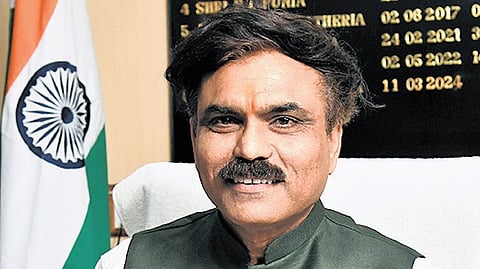

Several states, including Telangana, Andhra Pradesh and Haryana, have recently sub-classified Scheduled Caste (SC) categories to give targeted benefits to historically marginalised SC sub-groups.
The move follows last year’s Supreme Court ruling on sub-classification of SCs and STs, which ignited a widespread debate on its political and social consequences.
In an exclusive interview with Preetha Nair, Kishor Makwana, Chairman of the National Commission for Scheduled Castes (NCSC), shares his views on various SC community issues.
Excerpts:
The Telangana government recently conducted a caste survey and divided the SCs into three groups to ensure the effective distribution of welfare benefits, government schemes, and reservations. Do you support it?
Telangana has followed the SC verdict on sub-classification and has done its bit. However, I believe it is essential that the last person, the most oppressed among Dalits, be prioritised and empowered.
Several states, such as Haryana and Andhra Pradesh, are also going ahead with sub-classification. However, NCSC opposed the idea in the past. Can the states implement it, given the legal hurdles?
The SC ruling empowers state governments to take a more nuanced approach by creating sub-categories within these groups. The Commission is committed to ensuring that every individual, especially those at the very bottom of the socio-economic ladder, has access to the resources, education, and opportunities needed to break free from the cycle of poverty and oppression.
The Central government is yet to spell out its stand on the sub-categorisation of SC/STs.
No comments.
The SC has also proposed excluding the creamy layer among SC/STs from reservations. The Centre has opposed this. What is the Commission’s view?
Reservation is not meant to be a tool for economic empowerment alone; it is fundamentally about achieving social equality. Dr BR Ambedkar envisioned reservation as a means to address the social backwardness faced by the SCs and STs. In his view, affirmative action was intended to uplift communities oppressed and marginalised based on caste, allowing them to break free from the chains of social inequality. I agree that casteism still exists. However, things are slowly changing.
Prime Minister Modi, in his policies, has expressed a commitment to fulfilling Ambedkar’s vision by protecting the rights of marginalised communities and improving their social status. Through various initiatives and the continued implementation of affirmative action policies, the Modi government seeks to align with Ambedkar’s ideal. Thus, the aim of reservation remains firmly rooted in addressing social backwardness and not just economic disparities.
Certain sub-groups within the larger SC category face systemic discrimination and economic hardships. Empowering the most marginalised requires targeted policies that go beyond mere categorisation.
I agree that the issue needs more discussion. Everyone wants to prioritise the empowerment of the most marginalised individuals and the last person to be uplifted. Only when the most vulnerable individuals are lifted can true progress and equality be achieved for all.
Opposition parties favour a nationwide caste census to acquire empirical data on social issues. They cite the Telangana sub-categorisation, which has been done based on empirical data.
The Congress party was in power for 70 years. Why did they wake up now? They should have conducted a caste census during their tenure. The reason is that the Congress didn’t want the Dalits to get their rights.
Many also argue that sub-classification will fragment the SC/ST community and exacerbate existing social tensions.
The argument is not correct. I have met representations from several Dalit groups and other stakeholders. Everyone wants the most marginalised groups to be empowered, ensuring that even those often overlooked and excluded from mainstream society can thrive.
Should Dalit Muslims and Dalit Christians be given SC status?
The Commission is against providing the same benefits of reservation to Dalits converting to other religions. That is against the spirit of the Indian Constitution and Dr Ambedkar’s vision. For him, the caste system, which is deeply embedded in Hindu society, was the primary source of the oppression that Dalits faced. Dalit converts, who leave Hinduism due to its perceived caste-based discrimination, may be contradictory in demanding reservation while rejecting the religion that originally assigned them to these oppressed categories.